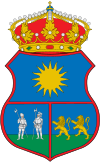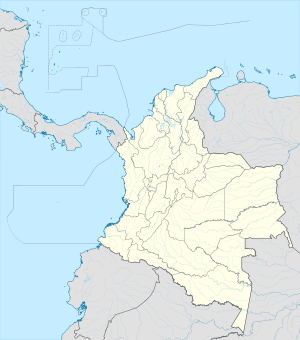Guadalajara de Buga
| Buga | |||
|---|---|---|---|
| Municipality and town | |||
 |
|||
|
|||
 Location of the municipality and town of Buga, Valle del Cauca in the Valle del Cauca Department of Colombia. |
|||
| Location in Colombia | |||
| Coordinates: 3°54′N 76°18′W / 3.900°N 76.300°W | |||
| Country |
|
||
| Department | Valle del Cauca Department | ||
| Founded | 1535 | ||
| Incorporated | 1884 | ||
| Area | |||
| • Total | 832 km2 (321 sq mi) | ||
| Elevation | 969 m (3,179 ft) | ||
| Population (2012) | |||
| • Total | 98,203 | ||
| • Density | 120/km2 (310/sq mi) | ||
| Demonym(s) | Bugueño | ||
| Time zone | Colombia Standard Time (UTC-5) | ||
| Area code(s) | 57 + 2 | ||
| Website | Official website (Spanish) | ||
Buga (Spanish pronunciation: [ˈbuɣa]), formally Guadalajara de Buga, is a city and municipality in the Valle del Cauca Department of Colombia. It is famous for its Basilica del Señor de los Milagros, which houses an image of Christ called el Señor de los Milagros ("the Lord of the Miracles").
Buga is a town with a cattle industry. It is 46 miles (74 km) from Cali.
Guadalajara de Buga, which is the city´s formal name, is one of the oldest cities in Colombia; founded in 1555 under the order of the Spanish conquistador Sebastián de Belalcázar and known as Buga la Real ("the Royal Buga" ) or La Ciudad Señora (“the Lady City”). It was the home of many wealthy families coming from Spain and settling in the New World.
King Philip II of Spain gave Guadalajara de Buga its city status officially at the end of the 16th century and also granted its coat of arms for the many services rendered to the crown. During colonial era, Buga was in the Royal Audience of Quito, initially part of the Viceroyalty of Peru, and from 1739 until the creation of the Republic of La Gran Colombia, part of the Viceroyalty of Nueva Granada. After the dissolution of the Gran Colombia, it became part of the Republic of Nueva Granada (modern-day Colombia, since the newly created Ecuador, successor of the Royal Audience of Quito, did not summon representatives from Cauca to its first congress.
During the years of Independence, Simón Bolívar, called el libertador ("the liberator”), visited the city on two occasions, for which commemoration plates were placed.
...
Wikipedia



